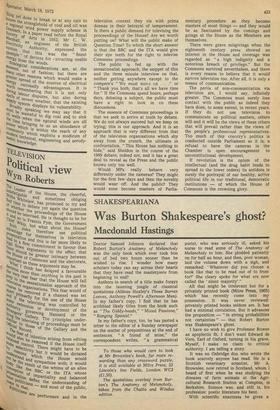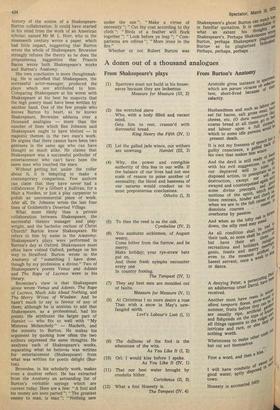SHAKESPEARIANA
Was Burton Shakespeare's ghost?
Macdonald Hastings
Doctor Samuel Johnson declared that Robert Burton's Anatomy of Melancholy was the only book which ever took him out of bed two hours sooner than he wished to rise. I wonder how many scholars today can say across their hearts that they have read the masterpiece from beginning to end?
Authors in search of a title make forays into the taunting jungle of classical quotations (Aldous Huxley's Those Barren Leaves, Anthony Powell's Afternoon Men). In my father's copy, I find that he has scribbled likely titles from the book such as "The Giddy-heads," "Mixed Passions," "Ranging Spaniel."
In my father's copy, too, he has pasted a letter to the editor of a Sunday newspaper on the matter of prepositions at the end of sentences. "A friend of mine," the correspondent writes, "a grammatical purist, who was seriously ill, asked his nurse to read some of The Anatomy of Melancholy to him. She plodded patiently on for half an hour, and then, poor woman, laid the volume down with a sigh, and remarked: 'Whatever did you choose a book like that to be read out of to from for?' She cleary spoke for what are now called the silent majority'."
All that might be irrelevant but for a privately printed book (Mitre Press, 1965) which has recently come into my possession. It was never reviewed: privately printed books seldom are. It has had a minimal circulation. But it advances the proposition — "in strong probabilities not certainties" — that Robert Burton was Shakespeare's ghost.
I have no wish to give Professor Rowse an apoplectic fit. I don't want Edward de Vere, Earl of Oxford, turning in his grave. Myself, I make no claim to critical authority. I am telling a story.
It was no Oxbridge don who wrote the book scarcely anyone has read. He is a Scottish veterinary scientist, Mr A.
Brownlee, now retired in Scotland, whom I heard of first when he was studying the diseases of farm animals at the Agricultural Research Station at Compton, in Berkshire. Science was, and still is, his profession: poetic literature his bent.
With scientific exactness he gives a history of the notion of a ShakespeareBurton collaboration. It could have started in his mind from the work of an American scholar, named Mr M. L. Horr, who in the nineteenth century wrote a paper, which had little impact, suggesting that Burton wrote the whole of Shakespeare. Brownlee strongly refutes the theory as he does the preposterous suggestion that Francis Bacon wrote both Shakespeare's works and Burton's Anatomy.
His own conclusion is more thoughtmaking. He is satisfied that Shakespeare, the successful actor-manager, produced the plays which are attributed to him. Comparing Shakespeare at his worst with Shakespeare at his best he suspects that the high poetry must have been written by another hand. One of the few people who knows Burton by heart, as he knows Shakespeare, Brownlee adduces over a thousand analogies — more than the number of lines which Ben Johnson said Shakespeare ought to have blotted — in majestic themes in the two men's work. He argues that there cannot have been two geniuses in the same age who can have thought so much alike. He claims that Shakespeare was a successful potboiler of entertainment who can't have been the same man who touched the stars.
Without getting hot under the collar about it, it is tempting to make a contemporary comparison. Few authors can claim that they have never had a collaborator. For a Gilbert a Sullivan, for a Muir a Norden, or just a play carpenter to polish an uncommercial piece of work. Afer all, Dr. Johnson wrote the last four lines of Goldsmith's Deserted Village.
What more likely than a private collaboration between Shakespeare, the successful theatre manager and playwright, and the bachelor recluse of Christ Church? Burton knew Shakespeare. He refers to him by name in the Anatomy. Shakespeare's plays were performed in Burton's day at Oxford. Shakespeare must often have visited Oxford, perhaps on his way to Stratford. Burton wrote in the Anatomy of "something I have done, though by my profession a divine." Two of Shakespeare's poems Venus and Adonis and The Rape of Lucrece were in his library.
Brownlee's view is that Shakespeare alone wrote Venus and Adonis, The Rape of Lucrece, Much Ado About Nothing, and The Merry Wives of Windsor. And he hasn't much to say in favour of any of them; although he is anxious to add that Shakespeare, as a professional, had his points. He attributes the larger part of Hamlet — who fits so well with "My Mistress Melancholy" — Macbeth, and the sonnets to Burton. He makes his argument by quoting how often the two authors expressed the same thoughts. He analyses each of Shakespeare's works, separating what he believes was written for entertainment (Shakespeare) from what was written for poetic delight (Burton).
Brownlee, in his scholarly work, makes even a doubter reflect. He has extracted from the Anatomy an astounding list of Burton's veritable sayings which are current today. Here are a few: "A fool and his money are soon parted "; "The greatest enemy to man, is man "; "Nothing new under the sun "; "Make a virtue of necessity "; " Cut thy coat according to thy cloth "; "Birds of a feather will flock together "; "Look before ye leap "; "Comparisons are odious "; "More irons in the fire."
Whether or not Robert Burton was a; Shakespeare's ghost Burton can what an extent his thoughtsto in familiar quotation. It is reMarkable Shakespeare's, Perhaps Shakespear:17, 61 Burton, perhaps Shakespeare [Holing'lava-bed. Burton as he plagiarise Perhaps, perhaps, perhapsd











































 Previous page
Previous page